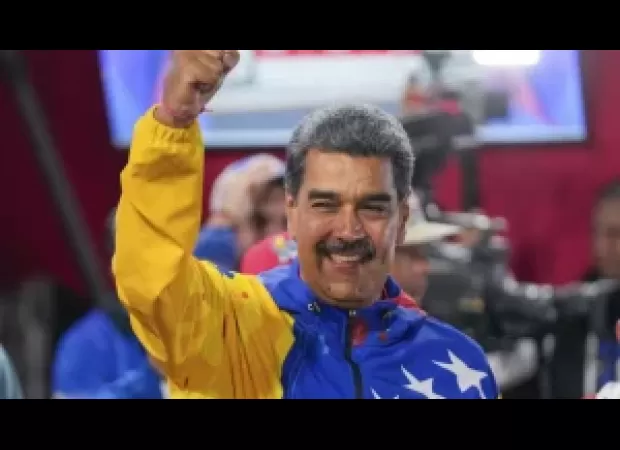Venezuelan President Maduro facing difficulties
Despite widespread protests, autocratic leaders like Venezuela's Nicolas Maduro maintain power by manipulating elections. Opposition rejects his recent win and calls on military to enforce true will of the people.

In recent times, there has been a concerning trend where autocratic leaders manipulate elections to maintain their hold on power despite widespread protests from the people. One such leader is Nicolas Maduro from Venezuela, who was recently declared as the winner of the election. However, the opposition has rejected this claim and is now calling on the military to step in and enforce the will of the people.
This situation is reminiscent of what happened in Bangladesh, where thousands of people took to the streets and are now urging the military to help establish a caretaker government after Prime Minister Sheikh Hasina fled the country. In the case of Bangladesh, there were doubts about the legitimacy of the election that declared Hasina as the winner, and many countries, including the UN, raised concerns. Similarly, there is a divide in the international community regarding Maduro's victory over opposition candidate Edmundo Gonzalez. Some countries, such as the US, have recognized Gonzalez as the rightful winner, while others like Brazil, Colombia, and Mexico are demanding transparency in the election results before acknowledging Maduro's claim.
Gonzalez and the opposition coalition, led by Maria Corina Machado, have evidence to support their claim that Gonzalez won by a landslide, with printed paper trails from Venezuela's electronic voting machines. They have made this data available online to show the world that Maduro's victory is fraudulent. This has put Maduro in a difficult position, with accusations that he has "stolen" the election.
Despite this, Maduro's autocratic allies have come to his defense, with countries like China, Cuba, Iran, Nicaragua, and Russia sending congratulatory messages to him shortly after the results were announced. These leaders all share an authoritarian character, and they have been crucial in helping Maduro survive protests and attempts to overthrow his government in the past.
Venezuela's economy has been in a dire state for years, with international sanctions, mass emigration, and economic collapse. But Maduro has managed to stay in power with the support of his allies, who provide aid to cushion the effects of the sanctions. In return, Maduro has been accused of pocketing most of the money from selling Venezuelan oil instead of using it to benefit the country's population. Countries like Russia and Iran have also helped Venezuela maintain its aging oil infrastructure, while China continues to be a significant buyer of Venezuelan oil despite the sanctions. Chinese technology has also been used to manage a database that tracks citizens and their voting patterns through the controversial "Fatherland Card."
As Maduro's grip on power becomes increasingly precarious, his allies are hesitant to come to his aid. Even countries like Colombia and Brazil, who have been allies in the past, are now calling for transparency in the election results. While Maduro may have the support of the military, the growing divisions within the country and isolation from other nations continue to raise questions about the legitimacy of his presidency.
It is becoming clear that autocratic rulers, such as Putin in Russia or Orban in Hungary, are unwilling to accept the fact that elections serve as a safety valve for citizens to express their discontent with their leaders. By manipulating this process, these rulers are ultimately harming themselves and their hold on power.






